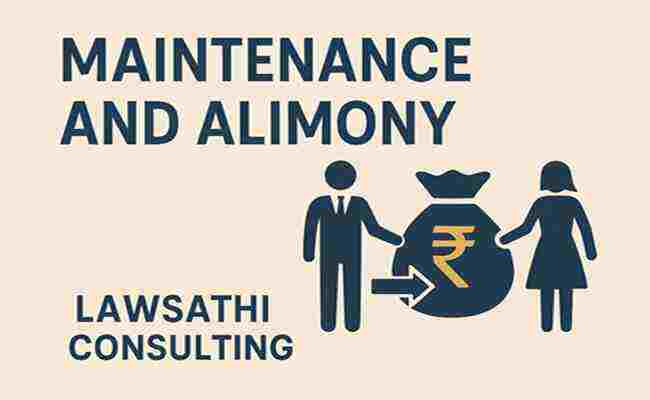
Maintenance and Alimony in Divorce
Understanding maintenance and alimony is essential when anyone begins the divorce process in India. Couples often feel confused about who can claim financial support, how courts decide the amount, and when support can be cancelled.
About Maintenance and Alimony?
Maintenance and alimony refer to financial support that one spouse pays to the other after or during divorce proceedings. Although both terms sound similar, they serve slightly different purposes.
Maintenance includes financial support that a spouse receives during or after the legal process.
Alimony usually refers to one-time settlement or long-term financial support granted after divorce.
Courts provide this support so that the financially dependent spouse can live with dignity and stability even after the marriage ends.
Purpose of Alimony and Maintenance
The concept aims to bring fairness into the divorce process. Because marriages involve financial and emotional partnership, separation should not push one spouse into hardship. Therefore, courts grant alimony and maintenance to:
Ensure financial stability for the dependent spouse
Support children’s education and upbringing
Reduce financial stress during legal proceedings
Balance the standard of living between both partners
Moreover, the law ensures that no spouse suffers financially simply because the marriage ended.
Types of Alimony and Maintenance
When couples approach the court for maintenance, they should understand two types of support: interim maintenance and permanent maintenance.
- Interim Maintenance
During the divorce case, one spouse may struggle with daily expenses. Therefore, the court can order the other spouse to pay interim maintenance. This amount helps meet essential needs such as food, rent, medical costs, and legal expenses. The court continues interim maintenance until the final judgment.
- Permanent Maintenance
After the divorce decree, the court may grant permanent alimony or permanent maintenance. It can be a lump-sum amount or monthly payments. The court decides the amount based on earning capacity, financial status, and future needs of both spouses.
Factors May Considered by the Court
Courts carefully evaluate multiple factors before fixing the amount. Because each marriage differs, no fixed formula applies. However, some major considerations include:
Income and earning capacity of both spouses
Standard of living during marriage
Age and health of both partners
Responsibility towards children
Duration of the marriage
Financial needs and liabilities
Conduct of both partners
Property, assets, and financial background
Additionally, courts examine whether the spouse seeking maintenance truly depends on the other or has an independent income.
Cancellation or Non-Issue of Alimony
Courts do not always grant alimony. In fact, several situations can lead to cancellation or refusal:
The spouse seeking support earns enough to maintain a similar lifestyle
The claiming spouse remarries
The claiming spouse lives in adultery
The spouse refuses to follow court directions
A significant change occurs in income or financial condition
Because alimony ensures fairness, courts deny it when the requesting spouse does not require support or acts in bad faith.
Frequently Asked Questions (FAQs)
- Who can claim maintenance in India?
Either spouse can claim maintenance, but usually the financially dependent spouse receives it.
- Can a husband claim maintenance?
Yes. If the husband is financially weaker and the wife earns more, he can seek maintenance.
- How long does alimony last?
It depends. Lump-sum alimony ends once paid, while monthly support may continue until remarriage, change in circumstances, or a new court order.
- Does adultery affect alimony?
Yes. If the spouse seeking maintenance commits adultery, the court may deny the claim.
- Can both parties mutually decide alimony?
Absolutely. Couples often decide the alimony amount by mutual consent during mutual divorce, which the court then approves.
- What if the spouse refuses to pay maintenance?
The court can issue warrants, attach salary, or take legal action to enforce payment.
- Is alimony taxable?
Lump-sum alimony is generally not taxable. However, monthly payments may be treated differently depending on the nature of the order.
- Does child custody influence maintenance?
Yes. The parent with custody often receives additional support for the child’s education and living expenses.
Conclusion
Alimony and maintenance create a financial safety net so that either spouse can move forward after divorce with dignity. Since each case differs, courts carefully evaluate income, lifestyle, and responsibilities before granting support. With the right legal guidance, you can handle the process smoothly and protect your rights effectively.
Disclaimer: This article is for educational and informational purposes only. It provides a general understanding of legal remedies but does not constitute legal advice. For specific legal guidance, you can consult a legal expert.




